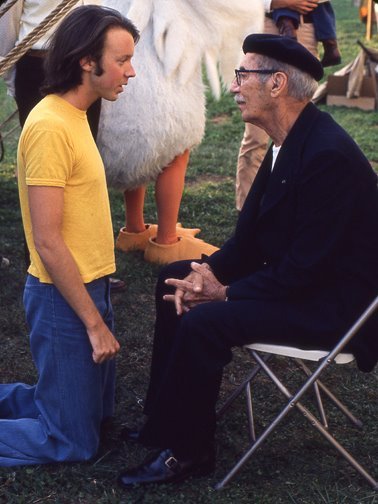Groucho engaged in long cons, often involving wooing wealthy dowager Margaret Dumont.
Chico (right) played an Italian-accented musical virtuoso planning cons of his own.
Harpo played his mute, addled sidekick, who liked to chase women while honking a horn. He also handed random people his leg.
Wait -- Zeppo falling in love with a woman, Groucho wooing a woman, Harpo chasing women. Granted, the wordplay came fast and furious, pretensions were deflated, social institutions were mocked -- but wasn't it still heterosexist?
Not at all. You can queer a Marx Brothers movie as easily as Making Love.
1. You don't expect a lot of beefcake in movies from the 1930s, but there was some. Mostly from incidental players.
In this still from Duck Soup, Zeppo looks pleasantly muscular for the 1930s, and Chico positively buffed.
2. In the heart of the Pansy Craze, there are no pansy jokes No screaming queens, no effeminate waiters, none of the overt homophobia evident in other movie comedies of the era.
3. Zeppo's hetero-romance is ludicrously over-the-top; it is one of the social institutions that the Marx Brothers are mocking.
Groucho woos Margaret Dumont for her money; elsewhere, his jabs and hints hit men and women both. "Tell me, what do you think of the traffic problem? What do you think of the marriage problem? What do you think of at night when you go to bed, you beast!"
Harpo hands his leg to women and men both.
Chico doesn't seem particularly interested in women.
All of the Marx Brothers demonstrate an easygoing nonchalance about same-sex desire that is remarkable for the period.
4. In real life, Groucho stated that he was "straight but curved around the edges."
My friend Randall claimed to have been with him at a party in Hollywood in 1958.
Near the end of his life, the 80-year old Groucho fell in love with 30-year old Bud Cort -- who starred in Harold and Maude (1971), about a romance between a teenage boy and an elderly woman. Bud moved into Groucho's mansion, where the question of whether they became physically intimate is nobody else's business. "I loved him, and he loved me. He was my fairy godfather."
See also: Dick Sargent, Cary Grant, and Groucho Marx in the Same Bed.




Groucho claimed that Chico (pronounced 'chick-oh', not 'cheek-oh') got his name because he chased chicks. But in the films, at least, Harpo did more chasing than he did.
ReplyDeleteThe brothers were reportedly notorious womanizers but growing up as traveling vaudeville performers left them with a Gay friendly attitude. Harpoon was close friends with people such as Alexander Wolcott while Groucho had a blues singer whose career had been damaged after being outed as a contestant on his quiz show. (He said nothing about it. It was the Fifties.)
ReplyDeleteI'd love to see a Bud Cort article as though he's a very private person, I've never really seen anything substantial or conclusive beyond some Datalounge posts and the occasional anecdote. He is too acquainted with the LGBT community to not be totally straight.
ReplyDeleteThat's Chico on the left and Zeppo on the right. Zeppo is the buff one; Chico was in very average shape. Harpo and Groucho were actually both in decent shape in their younger years. But Chico was an absolutely rampant womanizer, and his wife put up with years of him being unfaithful with any woman he could get his hands on (and it seems that thousands were willing). He was also a gambling addict and died penniless. There are a number of moments in their films where Chico hits on women, but his character was mainly interested in money; as for Harpo's chasing of women, it never lead to anything at all. The one time in their films he ended up in bed with someone, it was a horse (with the beautiful woman he had been chasing relegated to her own single bed). By the way, Harpo's character was not "addled" at all.
ReplyDeleteAs a gay man and lifelong Marx fan, I have never noticed the slightest evidence of queerness in their films (or their private lives, from what we know of them).
True, I can't think of any pansy jokes in a Marx Brothers film, but they had them in their stage shows, I believe. They came up through vaudeville and would have been well-acquainted with queer performers. Every show had a pansy character.
Groucho said that he was straight but "bent around the edges." Near the end of his life he had a romantic relationship with Bud Cort.
Delete